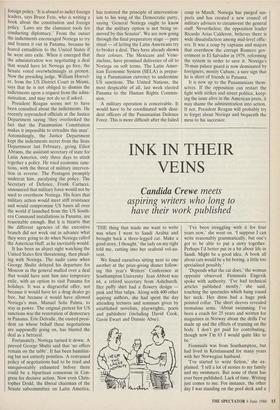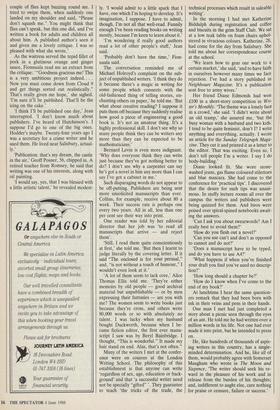INK IN THEIR VEINS
Candida Crewe meets
aspiring writers who long to have their work published
'THE thing that made me want to write was when I went to Saudi Arabia and brought back a three-legged cat. Make a good story, I thought,' the lady on my right told me, cutting into her seafood vol-au- vent.
We found ourselves sitting next to one another at the prize-giving dinner follow- ing this year's Writers' Conference at Southampton University. Jean Abbott was 64, a retired secretary from Ashchurch. Her puffy shirt had a flowery design — pink and blue tulips. Along with 400 other aspiring authors, she had spent the day attending lectures and seminars given by established novelists, playwrights, poets and publishers (including David Cook, Gavin Ewart and Dannie Abse). 'I've been struggling with it for four years now,' she went on. 'I suppose I can write reasonably grammatically, but one's got to be able to put a story together. Perhaps I'd better put in a bit about life in Saudi. Might be a good idea. A book all about cats would be a bit boring, a little too specialised possibly.'
'Depends what the cat does,' the woman opposite observed. Fionnuala Engevik spoke with authority. 'I've had technical articles published mostly,' she said, touching the spectacles which hung round her neck. Her dress had a huge pink pointed collar. The short sleeves revealed tremulous arms. 'About swimming. I've been a coach for 25 years and written for magazines in Norway about the drills I've made up and the effects of training on the body. I don't get paid for contributing, though now I'm 63 I would quite like to be.'
Fionnuala was from Southampton, but had lived in Kristiansund for many years with her Norwegian husband.
'I've started to write fiction,' she ex- plained. 'I tell a lot of stories to my family and my swimmers. But none of them has ever been published. Lack of time. Writing just comes to me. For instance, the other day I was standing on the pool deck and a couple of flies kept buzzing round me. I tried to swipe them, when suddenly one landed on my shoulder and said, "Please don't squash me." You might think that flies can't speak, but this one did, and I've written a book for adults and children all about him. A published author's seen it and given me a lovely critique. I was so pleased with what she wrote.'
As the waitress served the tepid fillet of pork in a glutinous orange and ginger sauce, Fionnuala read me an extract from the critique: "Goodness gracious me! This is a very ambitious project indeed.. . . Now you must come down from Cloud 9 and get things sorted out realistically." That's really given me hope,' she sighed. 'I'm sure it'll be published. That'll be the icing on the cake.'
'I think I'll be published one day,' Jean interrupted. 'I don't know much about publishers. I've heard of Hutchinson's. I suppose I'd go to one of the big ones. Hodder's maybe. Twenty-four years ago I was a secretary for a crime writer and he used them. He lived near Salisbury, actual- ly.'
'Publication: that's my dream, the castle in the air,' Geoff Posner, 56, chipped in. A retired teacher from Romsey, he said that writing was one of his interests, along with oil painting.
'I would say, yes, that I was blessed with a little artistic talent,' he revealed modest- 1y. 'I would admit to a little spark that I have, one which I'm hoping to develop. It's imagination, I suppose. I have to admit, though, I'm not all that well-read. Funnily enough I've been reading books on writing mostly, because I'm keen to learn about it.'
'I'm wondering if really good authors read a lot of other people's stuff,' Jean said.
'Probably don't have the time,' Fion- naula said.
The conversation reminded me of Michael Holroyd's complaint on the sub- ject of unpublished writers. 'I think they do it because there's a magic in writing for some people which connects with the old-fashioned thing of telling stories, en- chanting others on paper,' he told me. 'But what about creative reading? I suppose it puts them off because they suddenly realise how good a piece of engineering a good book is. It's not an amateur thing. It's a highly professional skill. I don't see why so many people think they can be writers any more than they can be expected to be mathematicians.'
Bernard Levin is even more indignant. 'Why does everyone think they can write just because they've got nothing better to do? I don't see why a carpenter can say he's got a novel in him any more than I can say I've got a cabinet in me.'
Such disparaging words do not appear to be off-putting. Publishers are being sent more unsolicited manuscripts than ever. Collins, for example, receive about 80 a week. Their success rate is perhaps one every two years. All in all, less than one per cent see their way into print.
One reader was told by her editorial director that her job was `to read all manuscripts that arrive — and reject them'.
'Still, I read them quite conscientiously at first,' she told me. `But then I learnt to judge literally by the covering letter. If it said "The enclosed is for your perusal," and, "is not without a touch of humour," I wouldn't even look at it.'
'A lot of them seem to lack core,' Alice Thomas Ellis told me. 'They're either memoirs by old people — good archival material but unpublishable — or by men expressing their fantasies — are you with me? The women seem to write books just because they're cross, and others write 80,000 words or so with absolutely no talent. I was lucky when my husband bought Duckworth, because when I be- came fiction editor, the first ever manu- script I saw was by Beryl Bainbridge. I thought, "This is wonderful." It made my hair stand on end. Alas, that's not often."
Many of the writers I met at the confer- ence were on cources at the London Writing School. The philosophy of this establishment is that anyone can write 'regardless of sex, age, education or back- ground' and that 'a successful writer need not be specially "gifted" '. They guarantee to teach 'the tricks of the trade, the technical processes which result in saleable writing'.
In the morning I had met Katherine Biddulph during registration and coffee and biscuits in the grim Staff Club. We sat at a low teak table on foam chairs uphol- stered in vivacious colours. Katherine, 28, had come for the day from Salisbury. She told me about her correspondence course at the school.
'We learn how to gear our work to a certain market,' she said, 'and to have faith in ourselves however many times we face rejection. I've had a story published in Neighbours Magazine. It's a publication sent free to army wives.'
Her friend Diane Edmonds had won £100 in a short-story competition in Wri- ter's Monthly. 'The theme was a lonely face in a crowd,' she said. 'I didn't write about an old tramp,' she assured me, 'but the busy woman with a husband and two kids. I tend to be quite feminist, don't I? I write anything and everything, actually. I wrote an article for the Sunday Telegraph Maga- zine. They cut it and printed it as a letter to the editor. That was exciting. Even so, I don't tell people I'm a writer. I say I do body-building.'
Diane looked fit. She wore stone- washed jeans, gas flame coloured stilettoes and blue mascara. She had come to the conference for 'practical tips'. I discovered that the desire for such tips was unani- mous. In stuffy lecture rooms all over the campus the writers and publishers were being quizzed for them. And biros were poised over spiral-spined notebook await- ing the answers.
'Can I ask you about swearwords? Am I really best to avoid them?'
`How do you flesh out a novel?'
'Can you use can't and don't as opposed to cannot and do not?'
`Does a manuscript have to be typed, and do you have to use A4?'
'What happens if when you've finished your draft you find you've used no descrip- tion?'
'How long should a chapter be?'
'How do I know when I've come to the end of my book?'
At lunchtime I hear the same question- ers remark that they had been born with ink in their veins and pens in their hands.
One man I met had just completed a story about a picnic seen through the eyes of an ant. He told me he had written over a million words in his life. Not one had ever made it into print, but he intended to press on.
He, like hundreds of thousands of aspir- ing writers in this country, has a single- minded determination. And he, like all of them, would probably agree with Somerset Maugham who wrote in The Moon and Sixpence, 'The writer should seek his re- ward in the pleasure of his work and in release from the burden of his thoughts; and, indifferent to aught else, care nothing for praise or censure, failure or success.'



















































 Previous page
Previous page